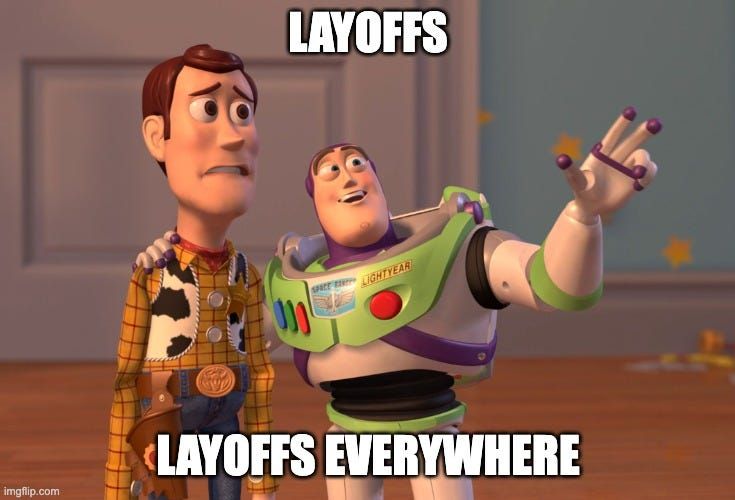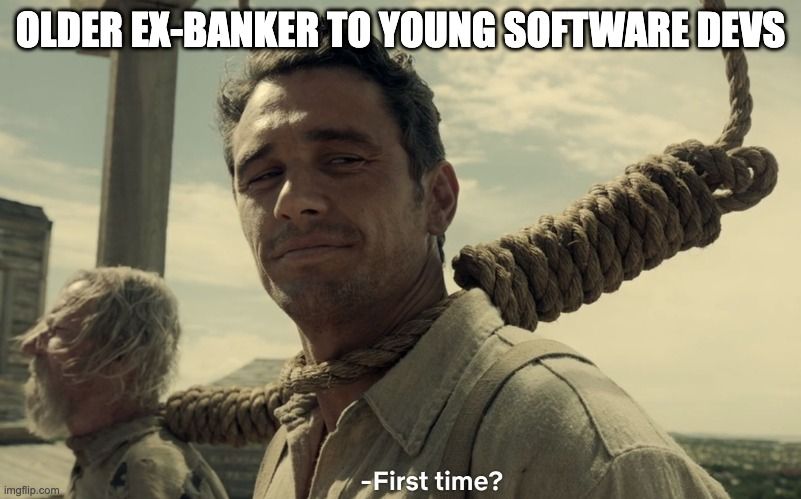Interesting Times
Welcome to the Global Financial System, young Paduan

This post is for the younger readers of my newsletter.
A few days ago, in response to my post about How to Hire a Kickass Team, someone asked me this on Twitter.
Looking forward for an article from you on "How to get hired?" in this current environment.
— Krishnan (@krishnan2273) November 12, 2022
I thought about this for a while and out popped the following. This is a free post, seeing as it is mostly for young people who are dealing with global and personal financial uncertainty for the first time in their life.
One day I was talking to my Dad — I must have been about 20 years old or so — and I said something along the lines of “Dad, your generation really fucked up. It’s going to be up to us to fix it. Thanks a lot. Why didn’t y’all do something”
He didn’t say anything but I understand now what he might have said. So before I say anything more I’d like to say that the problems of the world remain unsolved by my generation also. In fact the world is in many ways worse off than it was in 1995.
And boy oh boy does your generation have it rough. No sooner have you come of age than a global pandemic the likes of which no one alive has seen before rips through the world, shuts us all in our homes and makes us deal with wholesale tragedy. Many of you have suffered tragedy first hand and all of you have lived through wave after wave of high stress and scenes of unmitigated suffering for years on end. Your flight from the nest of your parents was rudely interrupted and all of you were scarred by it. Your entry into professional life happened from your bedroom dressed in pyjamas with curtailed access to mentors and the beneficial effect of a professional life lived amongst seniors.
There was for a while a small silver lining in the form of never before seen sums of money being thrown at you. But no sooner did the pandemic recede than comes the storm of economic recession. Far from emerging from the pandemic into a world rebuilding we find that the ruination continues unabated. Everywhere you look — layoffs. Perhaps you have been affected as well. Perhaps you are one of the lucky ones who dodged the bullet this time, but for how long.
Young people, my heart goes out to you. This is a lot for anyone to deal with at the start of your career.
Mid-career people have it bad as well. Many of them took very rational life decisions when their pay scales rocketed up. Many must have gotten married and started the process of assimilation into middle class life through the standard route of house and car loans. Now as the economy dries up they are facing a significant amount of financial uncertainty.
Add to that the world being closer to outright thermo-nuclear war than at any point during the Cold War, the climate crises that continue unabated and a myriad of risks facing the future of the human race and you would not be wrong to say that this is one of the most stressful times in living memory.
Unprecedented.
The rest of this essay is some thoughts about how to navigate this.
the world has always been ending.
I’ve lived through a few recessions in my lifetime and as a business graduate and ex-banker I have studied many more. Here’s the thing about recessions — they come and go. This is highly unlikely to be the end of the world. As messed up as the global financial system is it is highly anti-fragile and despite all the greed and corruption it manages to right itself from time to time.

Money is so core to our life as humans. Do you know that money was something that was right next to you when you were born and will be with you until the day you die? In large or small quantities, this thing we’ve created remains with us from birth to death. And as such a close companion of the human condition, it is but natural that the energy of money systems is like our human systems. It breathes in and out just like you and I do. And just like with our breath, where each exhalation is the cause of a subsequent inhalation and vice versa, this global financial system itself goes through its own inhalations and exhalations. It will not, it cannot last forever, this recession.
(Now of course, with humans there does come one final breath, one final exhalation that is not followed by an inhalation. But if you ask me, it is unwise to bet against the continued survival of the global financial system)
Of course, each of these crises takes a human toll. I don’t want to discount the suffering of those who lost everything in previous crashes or even for those untold millions who toil daily under the whip of the global capitalist system, but that is one of those problems that my generation could not fix. Fixing that is a historical project, and is a separate discussion.
What I want to say to you is don’t lose hope. This shall also pass. And there is a chance that these unprecedented events have forged in you all a resilience and a yearning to never repeat these errors that makes your generation the one to fix the world. For a while at any rate :-)
look after yourself.
As your generation looks out onto the economic and political system, you might well come to the conclusion that there is no one outside of your immediate kin who is invested in your well being. Bosses will work you within an inch of your life given half a chance, doctors will scam you, your search for justice will be never ending, the State may or may not protect you, your taxes don’t get you anything, neither good roads nor uninterrupted power nor safety nets for the poor.
And you’re right. There is only one person whose main job it is to look out for you and that is you yourself. In fact now that you are in your twenties you suddenly find that not only do you have to look after yourself you even have to look after your parents and if you don’t have them already then pretty soon you will have children to look after.
You are going to have to take on this responsibility and in order to do that you are going to have to get real strong real quick.
The elements of strength
Here are the pillars of your strength
- financial
- health - mental, physical and spiritual
- relationship.
Everything beyond health, relationships and finances is a mere detail. The responsibility of getting strong in each of these departments now lands squarely on your shoulders. Ready Player One?
Ready Player One
Based on my own experiences, I am now going to handing out some dangerous advice. Follow it at your own peril. It mostly worked for me but I am not you. You’ve been warned.
you are job number one
If you are middle-class and don’t have loads of property or Dad’s business to fall back on then the number one determinant of your financial strength is going to be your performance in the workplace. (Spoiler - founding a company is not an escape route from this truth)
Getting damn good at whatever you’re selling in the marketplace of skills is a critical factor in building financial strength.
If you’ve lost your job and don’t need to earn money right now, please take this as a golden opportunity to work on yourself and place yourself in the top 1% of people in your field. And I’ll also break this to you - it’s lonely at the top. I mean, this little newsletter of mine is likely already in the top 10% of substack newsletters in terms of amount of content in it. The vast majority of newsletters just have the initial post. Just showing up consistently every day for deliberate practice will put you in the top 10% of your field. Getting to the top 1% in your field is not so easy, but it is far from being out of reach. Almost no one puts in the work. So I’ll say it again, this time in bold letters.
If you do not have unavoidable financial commitments, then getting laid off now is a golden opportunity to put yourself in the top 1% of your field.
You have 2-5 years of experience in a field, you have tasted professional life, you have seen people who you aspire to be like, you’ve had your eyes opened and now out of the blue, you find yourself with some free time on your hands. Yes, you could use that time to look for another job, an endeavour which gets more difficult with each passing day, and then spend your precious youth working for some other man and consigning yourself to mediocrity because you neglected job number 1. Or, you could use the time to sharpen your weapon, become more powerful, well rested and ready for when this incredible Global Financial System is done breathing out and the cycle repeats all over again.
Think it over. No need to answer right away.
The brave amongst you might even want to volunteer yourself as tribute, save the people who have families depending on that paycheck as a result.
My own story might be instructive here, to make my biases clear. I got very financially lucky right at the start of my career and while my career as a banker was short lived and ended in ignominy, the financial freedom allowed me to shape my career more to my liking. If I got good at programming it was because I spent a lot of time hunched over my computer, unemployed and delirious with joy at my own growing understanding of programming.
Most of the progress I made in my career was because I punctuated it often with study breaks. If the word sabbatical sounds too much like something white-haired uncles do then you’re right. At your stage in your career you could do with a study break though.
What to study? I heard Data Science is hot! Should I get an AWS certification? Will there be a boom in cyber security?
All good questions, but they belie a certain lack of attention to what I’ve been saying. Study whatever you think you can do sustainably enough to be in the top 1% in that field. In other words, go with whatever lights your fire. The top 1% has no trouble earning a living.
Reminds me of the day I received the first study materials for CA (I’m a B.Com for those who don’t know). I took one look at it and said no way I can beat people who are actually enjoying this stuff. And I went back to programming in C.
And also fundamentals. All platforms like AWS, Kubernetes, etc. are all just manifestations of a set number of fundamentals in Computer Science. For more detail on this, read this post.
Here’s a semi-helpful Twitter thread about this
..and while you’re at it…
…use the time to work on your health. Everyone has been through a lot. Between the pandemic and startup hustle culture, you’ve put up with more stress in the last two years than the average Public Sector Bank employee goes through in their lifetime. I know the youth are resilient and have a seemingly endless source of energy, but if you’ve been neglecting your health over the past few years then use the break to get that back on track. Build good habits around your physical health because when you get back into professional life, the first thing to go out the window is all of this.
And while you’re working out your gym routine you might want to start paying some attention to the foundations of mental health as well. If you’re anything like I was at your age then there is a lot to learn about how to be happy, but you’ll only know what works for you by doing it. I’m not about to start prescribing particular practices to people I don’t know. All I can say is that there are very simple techniques to take control of your mental health (modulo pathological conditions of course)
look after each other
And last but not least, work on your relationships. Definitely on the close ones, parents, significant other and so on. And if you don’t have one already it’ll be good to get started on finding your professional compadres, the people who you will be bouncing off for the rest of your professional lives. There is a larger point to be made here about how no one is an island and we need meaningful professional friendships to see us through, but you get the picture.
faq
The one question I get asked a lot is ‘Won’t this career break look bad on my CV?’ The short answer in my experience is that
a) Mostly no and
b) don’t work at places where someone is going to hold this against you, it is a giant red flag! and
c) the 1% doesn’t have to deal with shit like this. Focus on getting there.
There’s a lot of ground to cover. Quit moaning about that job you lost and get to work on job number one. Unless of course you can’t afford the time off now. In which case it’s critically important to ride out the storm as best as you can.
What to do if this path is not open to you?
What if you do have unavoidable financial constraints and cannot deal with your loss of income? I don’t really have a good answer for you my friend. All I can say is that this shall also pass. For now you will have to do whatever it takes to keep your head above water. I’m truly sorry I don’t have a better answer for you.
The recession will not last forever. But the following good times will also not last forever. This merry-go-round is a force of nature and beyond your and my control. The best we can do is keep our house in order.
This is good advice regardless of recessions. A recession is a global event but personal misfortune can strike at any time. Having an emergency fund and insurance to cover catastrophic and unavoidable expenses are simply a matter of prudence.
In the meantime, here’s some pointers to companies that are hiring.
If you are affected by recent layoffs, please look at https://t.co/dLnZCnF3qS
— Ajey Gore (@AjeyGore) November 14, 2022
We have 2500+ jobs in the companies we partner with, and they will be happy to look at your profile.
Did a recent poll on LinkedIn to find out companies which are still actively hiring (in India mostly, this list).
— Arnav Gupta (@championswimmer) November 6, 2022
PayTM
PhonePe
PayPal
Cisco
Samsung
Oracle
Tata 1mg
DE Shaw
Media .net
Quantiphi
Persistent
Navi
Expedia
Spinny
Setu
Carousell
Tekion
Whatfix
Obligatory Disclaimer
Please do your own due diligence and financial planning before embarking on the path I just laid out before you. I am not liable if this recession remains in force longer than you can remain solvent.
If it’s any help, I am already in this boat. Rough seas make for interesting sailing!
All the best.

Comments ()